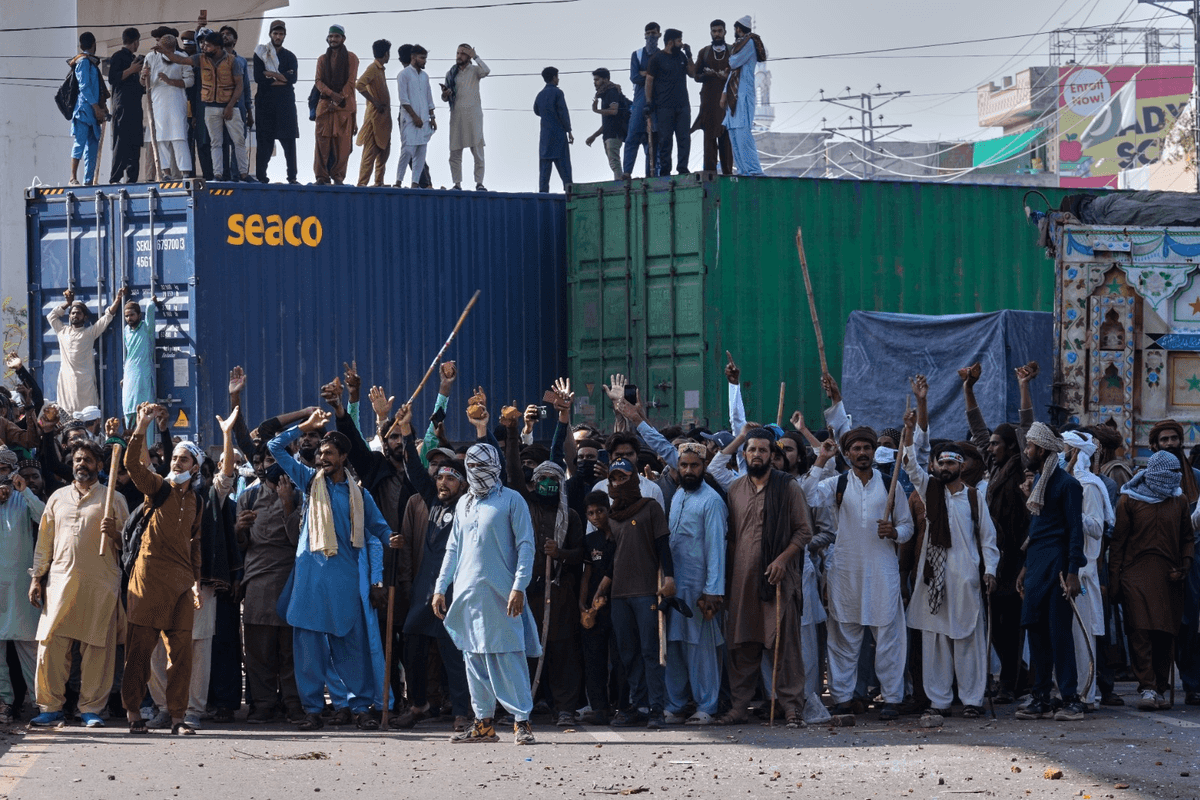Pakistan bans hardline religious group after violent protests
Ban follows a Punjab government reference accusing Tehreek-e-Labbaik Pakistan of inciting unrest, promoting sectarianism and defying state authority

Javed Hussain
Correspondent
I have almost 20 years of experience in print, radio, and TV media. I started my career with "Daily Jang" after which I got the opportunity to work in FM 103, Radio Pakistan, News One, Ab Tak News, Dawn News TV, Dunya News, 92 News and regional channels Rohi TV, Apna Channel and Sach TV where I worked and gained experience in different areas of all three mediums. My journey from reporting to news anchor in these organisations was excellent. Now, I am working as a correspondent with Nukta in Islamabad, where I get the opportunity of in-depth journalism and storytelling while I am now covering parliamentary affairs, politics, and technology.

TLP activists protest in Lahore on October 10, 2025, after authorities blocked roads ahead of their pro-Palestinian march to Islamabad.
Reuters
Pakistan’s federal cabinet on Thursday approved a ban on the hardline religious party Tehreek-e-Labbaik Pakistan (TLP), days after its violent protests in Lahore and Muridke triggered unrest and casualties.
The decision followed a high-level meeting chaired by Prime Minister Shehbaz Sharif, where law enforcement agencies briefed the cabinet on the group’s recent activities and their impact on public order.
Acting on a recommendation from the Punjab government, the cabinet directed the Ministry of Interior to complete the necessary legal and regulatory formalities to outlaw the group.
Why the ban?
Officials told the meeting that since its formation in 2016, TLP has consistently incited unrest and promoted violence across the country. The group was previously banned in 2021 by the then government, but the prohibition was lifted six months later on the condition that it would refrain from further violence - a commitment it has since violated.
The cabinet was informed that TLP’s repeated violent demonstrations and rallies have in the past resulted in the deaths of both security personnel and innocent bystanders.
A week earlier, the Punjab government had sent a formal reference to the federal cabinet, citing the party’s role in spreading unrest, promoting sectarianism, and challenging the writ of the state.
Punjab Information Minister Azma Bukhari said during a press conference that TLP chief Saad Rizvi and his brother would soon be arrested. She added that loudspeakers would be restricted to the call to prayer (Azan) and sermons only, warning that strict action would be taken against those possessing illegal weapons.
A reference related to the ban will also be forwarded to the Supreme Court within 15 days.
Expert view
Political analyst Ahmad Bilal Mehboob told Nukta that TLP has been banned under the Anti-Terrorism Act, similar to its earlier six-month ban that was later lifted.
He explained that if the action had been taken under the Elections Act, the case would have gone to the Supreme Court.
However, since this ban falls under the Interior Ministry’s jurisdiction, any appeal would be filed there - though he noted it’s unlikely to result in a major reversal, as the government appears to have strong justification backed by recent evidence, he added.
Legal framework for banning political parties in Pakistan
Under Article 17 of the Constitution, citizens have the right to form associations and political parties, but this right is subject to law and public order. After the federal government’s approval, the Ministry of Law prepares a reference to be filed in the Supreme Court, which can declare a party banned.
Following the Supreme Court’s orders, the Election Commission of Pakistan (ECP) may formally dissolve the party and issue a notification of the ban. Under the Election Commission Rules, 2002, a political party’s registration can be suspended or canceled if it violates the Constitution, breaches the law, or threatens public safety.
Similarly, the Anti-Terrorism Act, 1997, empowers the government to ban organizations involved in violence, terrorism, or spreading sectarian hatred. Once banned, a party’s bank accounts, social media platforms, and weapon licenses can be blocked. Such decisions, however, can be challenged in court, where the judiciary reviews their constitutionality and legality.
What is TLP?
Formed in 2015 by the late cleric Khadim Hussain Rizvi, TLP emerged from the Barelvi Sunni movement and gained prominence through mass demonstrations defending Pakistan’s blasphemy laws, which prescribe the death penalty for insulting the Prophet Muhammad (PBUH).
Now led by Rizvi’s son Saad Rizvi, the party has combined religious populism with anti-Western and anti-minority rhetoric, frequently staging large and disruptive street protests.
It was briefly banned in 2021 under anti-terrorism laws after violent clashes over demands to expel the French ambassador, though the ban was lifted later that year following negotiations with the government.
Since then, the group has been linked to several incidents of mob violence - including the 2023 arson attacks in Punjab’s Jaranwala town, where 21 churches were set ablaze - further fueling concerns about its radical influence and public safety threats.







Comments
See what people are discussing